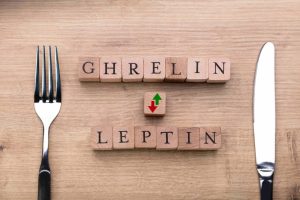Ever wonder why some days you feel ravenous and other days you barely think about food? The secret lies in two powerful hormones: leptin and ghrelin. These “hunger hormones” play a major role in controlling appetite, influencing whether you reach for seconds or push your plate away.
What Are Leptin and Ghrelin?
Leptin and ghrelin are hormones that communicate with your brain to regulate hunger and fullness. Think of them as your internal appetite regulators. Ghrelin whispers, “Hey, it’s time to eat.” while Leptin says, “Stop eating, you’re full.”
Leptin: The Satiety Hormone
Leptin is produced in your fat cells and travels through your bloodstream to the brain. Its main job is to signal when you’ve had enough to eat. Higher leptin levels usually mean you have enough stored energy, so your brain reduces appetite and boosts energy use.
Ghrelin: The Hunger Hormone
Ghrelin is produced mainly in the stomach and rises when your stomach is empty. It sends a message to your brain to stimulate hunger and encourage eating. Once you’ve eaten, ghrelin levels drop temporarily quieting hunger signals.
How Leptin Works
Leptin communicates with the hypothalamus, the brain’s hunger center. When leptin levels are high, your brain knows you have energy reserves, so it slows down eating and speeds up calorie burning.
How Ghrelin Works
Ghrelin spikes before meals, which is why your stomach starts growling right before lunch. It not only makes you feel hungry but also encourages food-seeking behavior, helping you maintain a regular eating pattern.
Leptin and Ghrelin: The Balancing Act
Ideally, leptin and ghrelin work together to keep your appetite in check. Ghrelin triggers hunger, you eat, leptin rises to tell you you’re full, and the cycle resets. But when this balance is disrupted you may overeat or struggle with cravings.
Leptin Resistance
Sometimes, even when leptin levels are high, the brain doesn’t “hear” the signal. This is called leptin resistance, and it can lead to constant hunger and weight gain. Common causes include obesity, chronic inflammation, and processed food-heavy diets.
High Ghrelin Levels
If ghrelin stays high even after eating, you may feel hungry all the time. This can happen with extreme calorie restriction, lack of sleep, or stress.
Impact on Weight Gain and Loss
Many people blame willpower when dieting fails, but hormonal imbalance often plays a big role. If leptin isn’t signaling properly or ghrelin levels remain high, it’s much harder to control appetite even with the best intentions.
READ MORE : The Hidden Roles of Prolactin, a Vital Hormone
Lifestyle Habits to Support Leptin
You can improve leptin sensitivity naturally by:
- Getting quality sleep (7–8 hours per night)
- Reducing inflammation with whole foods like vegetables, healthy fats, and lean protein
- Managing stress through mindfulness, yoga, or relaxation techniques
Lifestyle Habits to Reduce Ghrelin
- Eat regular, balanced meals to avoid extreme hunger spikes
- Include protein and fiber at each meal to promote fullness
- Avoid crash diets that keep ghrelin levels elevated
Exercise and Appetite Hormones
Exercise helps regulate both leptin and ghrelin. Strength training and moderate cardio can improve leptin sensitivity and keep ghrelin fluctuations stable, reducing the risk of overeating post-workout.

Role of Sleep in Appetite Control
Poor sleep is one of the biggest triggers for hormonal imbalance. Just one night of sleep deprivation can raise ghrelin and lower leptin, making you hungrier the next day. Prioritize a consistent bedtime and reduce screen time before sleep to keep hormones steady.
Practical Tips for Appetite Management
- Start meals with protein to feel full faster
- Drink water before eating, thirst is often mistaken for hunger
- Avoid high-sugar snacks that spike and crash hunger hormones
Conclusion
Leptin and ghrelin may be small hormones, but they have a big say in how much you eat. By understanding their roles you can take back control of your appetite and make healthier food choices effortlessly.
Source : https://www.healthyforlifemeals.com/blog/leptin-and-ghrelin-the-appetite-hormones











